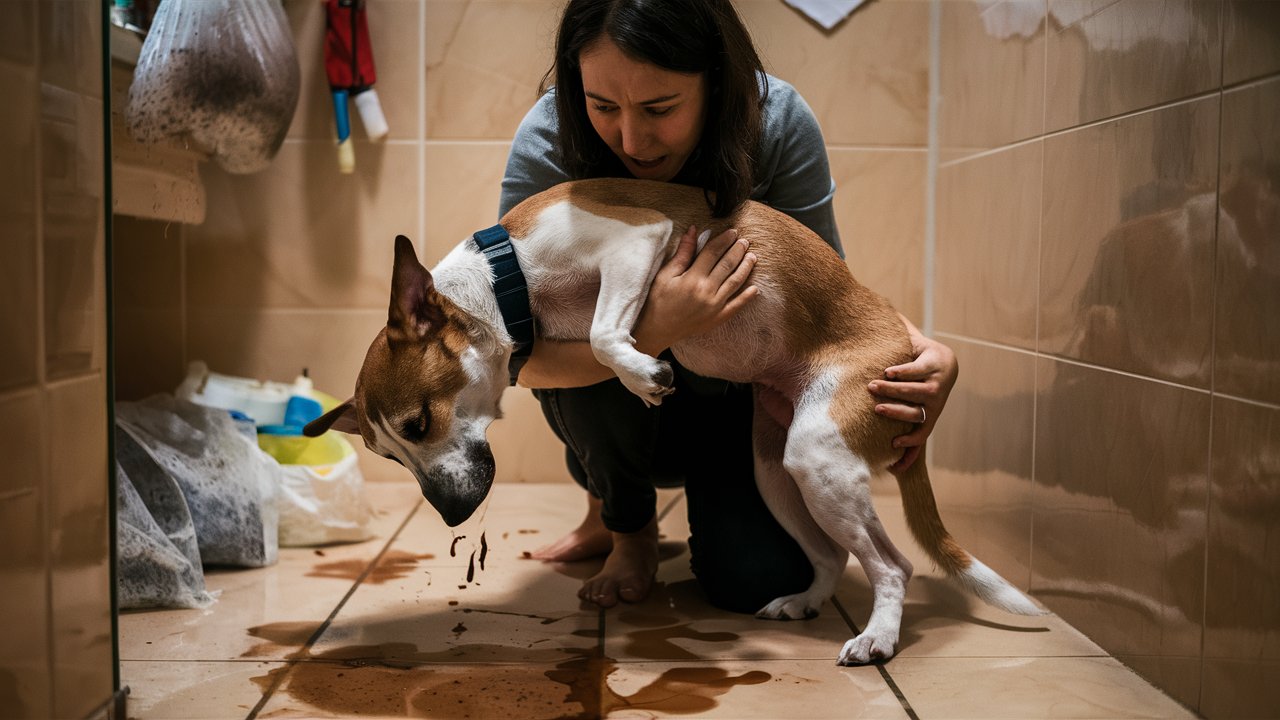
Dealing with Persistent Vomiting in Dogs: Causes, Symptoms, and Treatment Options
Caring for a dog often means dealing with unexpected health issues, and persistent vomiting is one of the more alarming symptoms. A dog’s frequent vomiting can indicate a serious underlying condition that demands immediate attention. This post will guide you through understanding the various causes behind your dog’s vomiting, recognize the associated symptoms, and explore the most effective treatment options. Equipped with this knowledge, you’ll be better prepared to make informed decisions about your pet’s healthcare, ensuring their well-being and swift recovery.
Common Causes of Persistent Vomiting in Dogs
Persistent vomiting in dogs can be distressing for both pets and owners. Understanding the common causes can help identify the problem early and seek appropriate treatment. Here are the typical dietary and medical reasons your dog might persistently vomiting.
Dietary Causes
Food Allergies: Some dogs develop allergies to common ingredients in their food, such as chicken, beef, dairy, or grains. These allergies can cause gastrointestinal upset, leading to frequent vomiting.
Food Intolerances: Unlike allergies, food intolerances occur when a dog’s digestive system cannot properly process certain foods. Common intolerances include lactose, gluten, or certain additives and preservatives.
Dietary Indiscretion: Dogs are notorious for eating things they shouldn’t. This can range from garbage, spoiled food, and foreign objects to toxic plants and chemicals. Consuming inappropriate items can irritate the stomach and cause persistent vomiting.
Medical Conditions
Gastrointestinal Issues: Conditions such as gastritis, gastric ulcers, or inflammatory bowel disease (IBD) can result in frequent vomiting. These conditions inflame the stomach lining or intestines, causing discomfort and vomiting.
Infections: Bacterial, viral, or parasitic infections can affect a dog’s gastrointestinal tract, leading to vomiting. Common culprits include parvovirus, distemper, and diseases caused by parasites like giardia.
Metabolic Disorders: Diseases affecting the liver, kidneys, or pancreas, such as pancreatitis, kidney disease, or liver failure, can lead to persistent vomiting as these organs play crucial roles in digestion and detoxification.
Poisoning: Ingesting toxins like antifreeze, certain plants, or foods toxic to dogs (e.g., chocolate, grapes, and onions) can lead to severe vomiting. Poisoning is a medical emergency that requires immediate veterinary attention.
By understanding these common causes, you can better identify potential issues and seek timely help from a veterinarian. This knowledge is key to ensuring your dog’s health and happiness. Stay tuned for more information on symptoms and treatment options for persistent vomiting in dogs.

Identifying Symptoms of Serious Issues
Recognizing the symptoms associated with persistent vomiting in dogs can help you determine whether the situation is benign or serious. Understanding the difference between mild and severe symptoms allows you to react promptly and get the necessary help for your furry friend.
Mild Symptoms
While occasional vomiting can be problematic, it doesn’t always indicate a severe problem. Here are some mild symptoms to watch out for:
- Occasional Vomiting: If your dog vomits once or twice but seems otherwise normal, this might not cause immediate concern. It could be due to minor dietary issues or stress.
- Slight Lethargy: A dog that seems slightly less energetic than usual might be experiencing a mild stomach upset. Ensure they have enough rest, and continue to monitor their activity levels.
- Decreased Appetite: A temporary loss of appetite might indicate that your dog feels under the weather. Offer bland food and make sure they stay hydrated.
These mild symptoms should be monitored closely. If they persist for more than a day or two or worsen, it’s crucial to consult your vet.
Severe Symptoms
Certain symptoms indicate more severe health problems and require immediate veterinary attention. These severe symptoms include:
- Constant Vomiting: If your dog cannot keep anything down and vomits repeatedly, it’s a sign of a potentially serious condition. Chronic vomiting can lead to dehydration and other complications.
- Blood in Vomit: Seeing blood in your dog’s vomit is a red flag. It could be due to internal bleeding, ulcers, or severe infections. Immediate veterinary intervention is necessary.
- Severe Lethargy: If your dog becomes excessively tired and uninterested in activities they usually enjoy, it might be more than just a minor upset. Severe lethargy can indicate substantial health issues.
- Rapid Weight Loss: Noticeable weight loss over a short period is alarming. It can indicate underlying diseases like cancer, severe infections, or metabolic disorders.
When severe symptoms are present, seeking veterinary care as soon as possible is critical. Early detection and treatment are vital to managing any serious underlying conditions effectively.
Immediate Actions to Take
When your dog begins to vomit persistently, it can be worrying. Acting quickly and correctly can help alleviate your dog’s discomfort and prevent the situation from worsening.
Withholding Food and Water
The first step is often to withhold food and water. This may seem counterintuitive, but giving your dog’s stomach time to settle is crucial.
- Rest for the Stomach: Allow your dog’s stomach to rest by withholding food and water for at least 12 hours. This break helps reduce gastric irritation.
- Preventing Further Vomiting: Not giving more food or water minimizes the chance of additional vomiting, which can exacerbate dehydration and discomfort.
- Gradual Reintroduction: Water will be reintroduced slowly after the initial 12-hour fasting period. Offer small amounts of water every 30 minutes to ensure your dog can keep it down. If they tolerate water, you can slowly reintroduce bland food such as boiled chicken and rice.
Monitoring the Dog
While withholding food and water, closely monitor your dog’s symptoms to determine if veterinary care is needed. Keep an eye out for the following:
- Frequency and Severity of Vomiting: Note how often your dog vomits and if there is any change in the colour or consistency of the vomit. If persistent and severe vomiting warrants a call to the vet.
- Hydration Levels: Check for signs of dehydration, such as dry gums, sunken eyes, and decreased skin elasticity. You can do a quick skin test by gently pinching the skin on your dog’s back; if it doesn’t return to normal immediately, they might be dehydrated.
- Overall Behavior: Observe your dog’s behaviour for signs of lethargy, depression, or discomfort. It may indicate a more serious issue if your dog seems unusually tired or uninterested in usual activities.
- Presence of Blood: If blood is present in the vomit, it’s a sign of potentially severe gastrointestinal or internal issues. Immediate veterinary attention is necessary.
Here’s a checklist to help you monitor your dog effectively:
- 🟢 Vomiting Frequency: Note every incident of vomiting.
- 🟢 Appearance of Vomit: Look for any changes or the presence of blood.
- 🟢 Hydration Status: Check for dry gums and sunken eyes regularly.
- 🟢 General Behavior: Monitor for changes in energy levels and overall mood.
These immediate actions can help manage your dog’s persistent vomiting and provide vital information for your vet. Remember to act swiftly and stay observant to ensure your furry friend’s well-being.
Veterinary Diagnosis and Treatment
When your dog is suffering from persistent vomiting, it’s essential to seek veterinary care. Your vet will determine the underlying cause and recommend appropriate treatments. Here’s what you need to know about the available diagnostic tests and treatment options.
Diagnostic Tests
Your vet might perform diagnostic tests to identify the root cause of your dog’s vomiting. These tests help pinpoint the exact issue and decide the best course of treatment.
Blood Tests: Blood tests are usually the first step in diagnosing any condition. They help evaluate the dog’s overall health and identify issues like infections, metabolic disorders, or organ dysfunction.
X-rays can reveal blockages, tumours, or foreign objects in the gastrointestinal tract. They provide a visual of the internal organs and help diagnose structural problems.
Ultrasounds: An ultrasound provides a detailed image of the internal organs, offering insights into abnormalities that might not be visible on an X-ray. It’s especially useful for examining the stomach, intestines, liver, and kidneys.
Endoscopies: This procedure involves inserting a tiny camera into your dog’s digestive tract. It helps directly visualize internal structures and detect ulcers, tumours, or blockages.
By utilizing these diagnostic tools, vets can confirm the underlying cause of vomiting and develop a targeted treatment plan.
Treatment Options
Once the diagnosis is clear, your vet will recommend treatment options tailored to your dog’s condition. Here are the common approaches:
Medications: Depending on the diagnosis, various medications might be used to treat the condition. These can include anti-nausea drugs, antacids, antibiotics for infections, or medications to manage underlying diseases like IBD or pancreatitis.
Dietary Changes: Often, changing your dog’s diet is necessary. Your vet may recommend a hypoallergenic diet if food allergies are suspected or a special digestive care diet designed to be gentle on the stomach. Transitioning to bland foods like boiled chicken and rice can also help in the short term.
Potential Surgeries: In severe cases, surgery might be required. This is typically necessary if a blockage, tumour, or severe gastrointestinal issue cannot be treated with medication alone. Surgeries can range from removing foreign objects to addressing more complex problems like stomach torsion or severe ulcers.
Your vet can help manage and alleviate your dog’s persistent vomiting through these treatment options. Prompt and accurate diagnosis followed by appropriate treatment can significantly improve your pet’s health and quality of life.
Home Care and Prevention
Managing a dog recovering from persistent vomiting requires attentive home care and adopting preventive measures to avoid future episodes. Here’s how you can ensure your furry friend’s health and well-being during recovery and prevent recurring issues.
Home Care Tips
When your dog is recovering from vomiting, supportive home care is essential. Here are some practical tips to help your pet get back on its paws:
Hydration: Keeping your dog hydrated is crucial. Vomiting can lead to dehydration, so ensure your dog can always access fresh water. You can also offer ice chips if they are reluctant to drink.
Feeding Small and Frequent Meals: Instead of giving large meals, divide your dog’s food into smaller, more frequent portions. This approach helps reduce the strain on their digestive system and allows it to recover gradually.
Rest: Just like humans, dogs need rest to recuperate. Make sure your dog gets plenty of quiet time in a comfortable space. Avoid strenuous activities and allow their body the time it needs to heal.
Following these home care tips can help your dog recover more quickly and comfortably from their vomiting episode.
Preventive Measures
Prevention is always better than cure. Here are some effective strategies to prevent future vomiting incidents:
Appropriate Diet: It is vital to feed your dog a balanced, high-quality diet tailored to their specific needs. Avoid sudden changes in their diet and steer clear of foods that cause allergies or intolerances.
Avoiding Toxins: Ensure your home and garden are free from common toxins and hazardous materials. Keep chemicals, medications, toxic plants, and human foods like chocolate and grapes out of reach.
Regular Health Check-Ups: Routine veterinary check-ups are essential. Regular visits help catch potential health issues early, allowing for timely intervention. Your vet can also provide personalized advice for maintaining your dog’s health.
Implementing these preventive measures can minimize the risk of persistent vomiting and ensure your dog’s long-term health and happiness.
Conclusion
Persistent vomiting in dogs is a serious issue that requires prompt attention. Understanding the common causes—dietary or medical—enables early identification and intervention. Recognizing symptoms, differentiating between mild and severe signs, and knowing immediate actions are crucial in managing this condition.
Veterinary diagnosis and tailored treatment are essential to address the underlying issue effectively. Home care and preventive measures play a significant role in your dog’s recovery and overall well-being. Early intervention and consulting a veterinarian cannot be overstated for ensuring your dog’s health and happiness.

